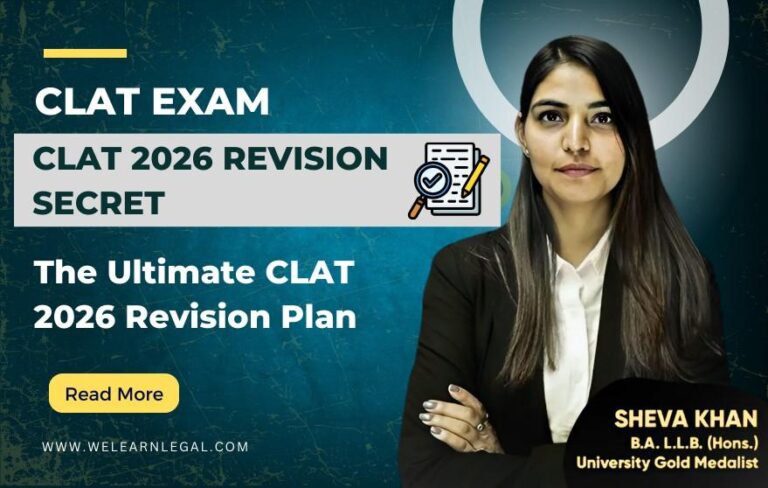I know that you are here to know the details of the CLAT eligibility criteria to start your journey for the CLAT exam.
I will surely take you through all the important details in a very simplified manner.
But before that, I would like you to know this short story of my life.
Back in my school days, I once prepared very hard for a self written poem recitation competition.
I was very excited to take part in it as it was my hobby to write poems.
I took extra efforts, chose to miss some of my basketball sessions and even dropped out of a pre-planned family dinner to make sure that I was able to write the best and practice well before the competition.
With all my enthusiasm and prep, I went to register myself a day before the competition.
But do you know what shattered my heart?
It was only that day when I discovered that the competition was ONLY for Hindi speakers!
Yes, you’re thinking right…
Of course, I had written and practiced my poem in English.
All my hard work and efforts seemed to have been in vain.
I was not eligible for the competition!
That day I made a promise to myself that if I would ever do anything in my life now, I will make sure to know all the important details about it and then only will start preparing.
So, you have the idea now…
CLAT Exam..
That’s your competition, right?
So you are at the right place to understand the CLAT Eligibility 2025 and let’s find out if you are eligible for the exam or not…
Let’s get started!
1. CLAT Exam: An Overview
The CLAT exam is amongst the most looked upon and competitive exams for law entrance in India. It is conducted every year in December by the Consortium of NLUs to take in students to the 24 National Law Universities in the country.
The CLAT exam 2025 is scheduled to be conducted on 1st December 2024.
| ⭕️ DATE | ✅ EVENT |
|---|---|
| July 15, 2024 | CLAT 2025 Application Date |
| October 15, 2024 | Last Date of CLAT 2025 Application |
| November 2024 (Last week) or December 2024 (First week) | CLAT 2025 Admit Cards |
| December 01, 2024 (Offline) | Release of CLAT Answer Key |
| 1st December 2024 | CLAT Exam 2025 |
| December 2024 or January 2025 | CLAT 2025 Results |
| CLAT 2025 counseling | January 2025 |
Visit the official website of the Consortium of NLUs here: https://consortiumofnlus.ac.in
The exam consists of 120 passage-based multiple-choice questions covering subjects like English Language, Current Affairs & General Knowledge, Legal Reasoning, Logical Reasoning, and Quantitative Techniques.
Do make sure to read the CLAT exam syllabus and CLAT Exam Pattern in detail to not miss any important information.
2. CLAT Eligibility Criteria 2025: Highlights
For the ease of your understanding, let’s first see the CLAT eligibility criteria in short points.
The Consortium of NLUs mainly talks about a candidate’s eligibility criteria based on three heads, which are educational qualification, age limit and minimum marks required.
So let’s first see some highlights of CLAT eligibility criteria.
| ⭕️ CRITERIA | ✅ ELIGIBILITY |
|---|---|
| Educational Qualifications | Completed class 12 from a recognised board |
| Current class 12 students who are due to pass out in 2025 can apply | |
| Minimum Marks (Aggregate marks in class 12) | General/OBC/PWD/NRI/PIO/OCI: 45% |
| SC/ST: 40% | |
| Age Limit | There is NO age limit for the CLAT 2025 UG exam |
3. CLAT Eligibility Criteria 2025: Detailed
Besides the points mentioned above, there are a few more details to be covered to completely understand the CLAT eligibility criteria.
Let’s look at them in detail in this segment.
3.1 Educational Qualification and Qualifying Marks
The educational qualification as per CLAT eligibility is quite simple to make sure that the candidates are in no way overburdened due to their school and 12th board exams.
A candidate belonging to general or OBC category must have attained a minimum of 45% marks in his 12th class in order to be eligible for the CLAT exam.
There is a relaxation of further 5% for students belonging to the SC/ST category, which makes it a minimum of 40% marks in their 12th exams.
Another confusion that is very common amongst the candidates is whether they must have passed the 12th boards to be able to take the CLAT exam or even the students appearing for the 12th exams in the upcoming March can also take the exam in December.
Both!
CLAT eligibility criteria mentions that students who are currently in class 12th or have passed class 12th from a recognised board can appear for the CLAT exam. The only condition is that those who are current class 12th students due to appear in the March/April 2025 exams can apply, but proof of passing is required at admission.
3.2 Age Limit for CLAT Exam 2025
This is perhaps the most relaxing part of the CLAT eligibility criteria that successfully widens the scope of candidates appearing for the exam.
There is NO upper age limit for candidates appearing for the CLAT UG 2025 exam. This ensures that candidates of all age groups can pursue their aspiration of studying law at one of the NLUs.
So, if by any reason, dear reader, if you belong to any age bracket, you can surely take the CLAT exam!
3.3 CLAT Eligibility Criteria for NRI Students
The country belongs to all…
Be it the citizens who live here or the Non Resident Indians (NRIs), who live far away from the motherland.
And if what stands common between both is the passion to study the law of the land, then they are both welcome by the CLAT eligibility criteria.
The CLAT exam is open to NRIs as well. But such candidates have specific CLAT eligibility criteria and documentation requirements.
Let’s cover them one by one.
3.3.1 Documents Required for NRI Candidates
The list of documents required from NRI candidates is a bit longer than the other candidates for obvious reasons. So if you are a NRI candidate looking forward to apply for the CLAT exam, do make sure that you submit the following documents:
- Copy of valid Indian passport of the student
- Visa details (visas obtained in the last 12 months)
- Certificate from the Indian embassy or consulate in the respective country stating NRI/OCI status or PIO (Persons of Indian Origin) card
3.3.2 Documents Required for NRI Sponsored Candidates
There is a difference between the NRI Candidates and NRI sponsored candidates.
While the NRI candidate is himself a non-resident of the country, the NRI sponsored candidates are those whose education is sponsored by a first degree blood relation or second degree blood relation who is an NRI/OCI Card Holder/PIO Card Holder. This shall include one’s parents, grandparents, siblings or parent’s siblings.
According to the CLAT eligibility criteria, the following documents are required to be submitted:
- Sponsorship affidavit stating the sponsor’s relationship with the candidate
- Sponsor’s copy of valid Indian passport
- Certificate from the local embassy stating NRI/OCI status or PIO Card of the sponsor (Proof of the sponsor’s NRI status)
- An affidavit by the sponsor showing interest in the student’s education and willingness to fund it over the next five years.
So make sure to have all these documents to have an easy admission process.
4. CLAT Eligibility Criteria for Admissions in NLUs
Once you have cleared the CLAT exam, you must be very thrilled and excited to get your admission in your dream NLU.
But you need to take care of a final set of few requisites and documents to get things done.
Generally, each NLU may have its specific eligibility criteria in addition to the general CLAT eligibility criteria. And so, the candidates must ensure they meet the individual NLU requirements for admission.
These criteria often include domicile requirements, reservations for specific categories, and additional documentation (if you had applied for the same benefits while filling the form for the exam).
But yes, the following three things are commonly expected out of you so that you can be admitted to your NLU and start your legal learning career.
✅ Passed Class 12 with a minimum of 45% for General/OBC/PWD/NRI/PIO/OCI and 40% for SC/ST.
✅ Appeared in the CLAT 2025 entrance examination.
✅ Their name should be in the CLAT allotment lists.
CLAT Eligibility Criteria 2025: FAQs
Here are some frequent doubts that the students face around understanding the CLAT eligibility.
You can refer to these for more clarity.
Can a student who has appeared for the 10+2 examination but is awaiting results apply for CLAT UG 2025?
Yes, students who have passed their 12th exams and those who are appearing for their 12th examination in March/April 2025 can apply for CLAT UG 2025. However, they must provide proof of passing the examination at the time of admission.
Is there an age limit for appearing in the CLAT UG 2025 exam?
The Consortium of NLUs mentions no upper age limit for appearing in the CLAT UG 2025 exam. A candidate of any age group is welcome to pursue his passion for studying law.
What is the minimum percentage required in 10+2 to be eligible for CLAT UG 2025?
The CLAT eligibility criteria mentions a minimum marks requirement of 45% for candidates of general/OBC/PWD category and 40% for the candidates of the SC/ST category.
What documents are required for NRI candidates applying for CLAT UG 2025?
The list of documents required from NRI candidates is a bit longer than the other candidates for obvious reasons. So if you are a NRI candidate looking forward to apply for the CLAT exam, do make sure that you submit the following documents:
1. Copy of valid Indian passport of the student
2. Visa details (visas obtained in the last 12 months)
3. Certificate from the Indian embassy or consulate in the respective country stating NRI/OCI status or PIO (Persons of Indian Origin) card
Are there any specific criteria for NRI sponsored candidates?
According to the CLAT eligibility criteria, the following documents are required to be submitted:
1. Sponsorship affidavit stating the sponsor’s relationship with the candidate
2. Sponsor’s copy of valid Indian passport
3. Certificate from the local embassy stating NRI/OCI status or PIO Card of the sponsor (Proof of the sponsor’s NRI status)
4. An affidavit by the sponsor showing interest in the student’s education and willingness to fund it over the next five years.
Do all NLUs have the same eligibility criteria for admission?
While the general eligibility criteria for CLAT UG 2025 are the same for all NLUs, each NLU may have specific requirements such as domicile reservations, category reservations, and additional documentation. Candidates must check the individual NLU criteria for admission. But yes, the following three things are commonly expected out of you so that you can be admitted to your NLU and start your legal learning career.
✅ Passed Class 12 with a minimum of 45% for General/OBC/PWD/NRI/PIO/OCI and 40% for SC/ST.
✅ Appeared in the CLAT 2025 entrance examination.
✅ Their name should be in the CLAT allotment lists.
Conclusion
I am quite sure that by now, if you read this article about the CLAT 2025 eligibility criteria thoroughly, you have a clear idea about the requirements of the CLAT exam and that you understand what all you need to do for the exam.
So gear up and start from here!
Also, ensure you stay updated with any changes or announcements regarding the CLAT UG 2025 eligibility criteria to avoid any last-minute issues.
Good Luck!








